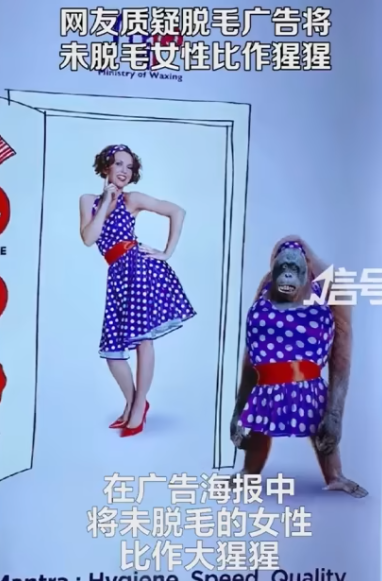There is some hairy business going on.
Strip: Ministry of Wax, a waxing chain with its origins in Singapore, is coming under fire in Shanghai, China for the content of its advertisements.
Their advertisements have raised some eyebrows by featuring orang utans together with a stereotypical hairless woman.
The juxtaposition has not sat well with Chinese netizens who resist drawing comparisons between an unshaven woman and a hairy orangutan.
Controversy About the Advertisement Content
Last week, the advertisements from Strip were going viral on Weibo and Douyin, which are popular social media platforms in China.
Weibo is similar to the micro-blogging site Twitter or Mastodon (for those of you who made the jump after Elon Musk’s takeover of Twitter). Douyin is the Chinese version of short video content TikTok.
One of the advertisements in question depicted an orang utan holding the hand of a bikini-clad woman jumping into a body of water. This image is currently the profile picture of the Instagram account of Strip Singapore (@stripsg).
The other offensive advertisement criticized by the Chinese showed a svelte woman in a blue and white polka dotted dress and a decidedly less attractive orang utan in the same outfit.


The Chinese captions on this image roughly translate to “netizens suspect that the hair removal advertisements compare women to orang utans” with a second caption driving the point home that “advertisements in Shanghai compare women who do not undergo hair removal to orang utans”.
Join our Telegram channel for more entertaining and informative articles at https://t.me/goodyfeedsg or download the Goody Feed app here: https://goodyfeed.com/app/
Strip: Ministry of Wax’s Response
In response to the backlash, Strip has said that their advertisements have been “misinterpreted”.
The intention behind including the orang utan was strictly a bona fide one, meant as a nod to Singapore’s iconic orang utans.
RIP Ah Meng—anyone still remember her?
Strip also emphasized that it “never engages and will never engage in shame campaigns to push or influence people to accept beauty services that benefit us”.
Further, their advertisements were made with the standards of uploading with “good humour” and “respect for females as well as males”.
It seems that there is some truth behind Strip using orang utans as their mascot.
An Instagram post on Strip Singapore’s account from June 2021, when Singapore was still in the thick of the COVID-19 pandemic, shows an orang utan with a mask on. No women in sight, hairless or otherwise.
View this post on Instagram
In any case, it appears that the Chinese netizens have “won” in their protest against such potentially degrading advertisements.
The orang utan-featuring advertisements are no longer being used in mainland China as well as Hong Kong, where Strip has branches in. It’s unclear if the hair removal business will cease the use of these advertisements in its other branches located in Malaysia, Thailand, Philippines and Singapore.
It’s a smart PR move, given that these faceless Chinese netizens hold great power and are always on the prowl to look for the next offending brand to cancel.
Read Also:
- 11YO Required 3 Stitches After Swimming in Bedok Swimming Pool
- Ikea S’pore Responded After Allegation of Multiple Bugs Found in Sofa
- ACS (Primary) Will Start to Accept Girls & Name of Old Campus Will be Changed, Too
- This 47YO Woman is a Grandmother, Runs 5 Businesses & Also Won a Beauty Pageant
- Father Went to Primary School, Claimed Teacher Was Lazy & Threatened to Kill Principal
Featured Image: Weibo (@信号财经) / Instagram (@stripsg)
Would you be jailed for being half-naked in public? Well, the answer will shock you. Seriously. Watch this to the end and you'll understand:



